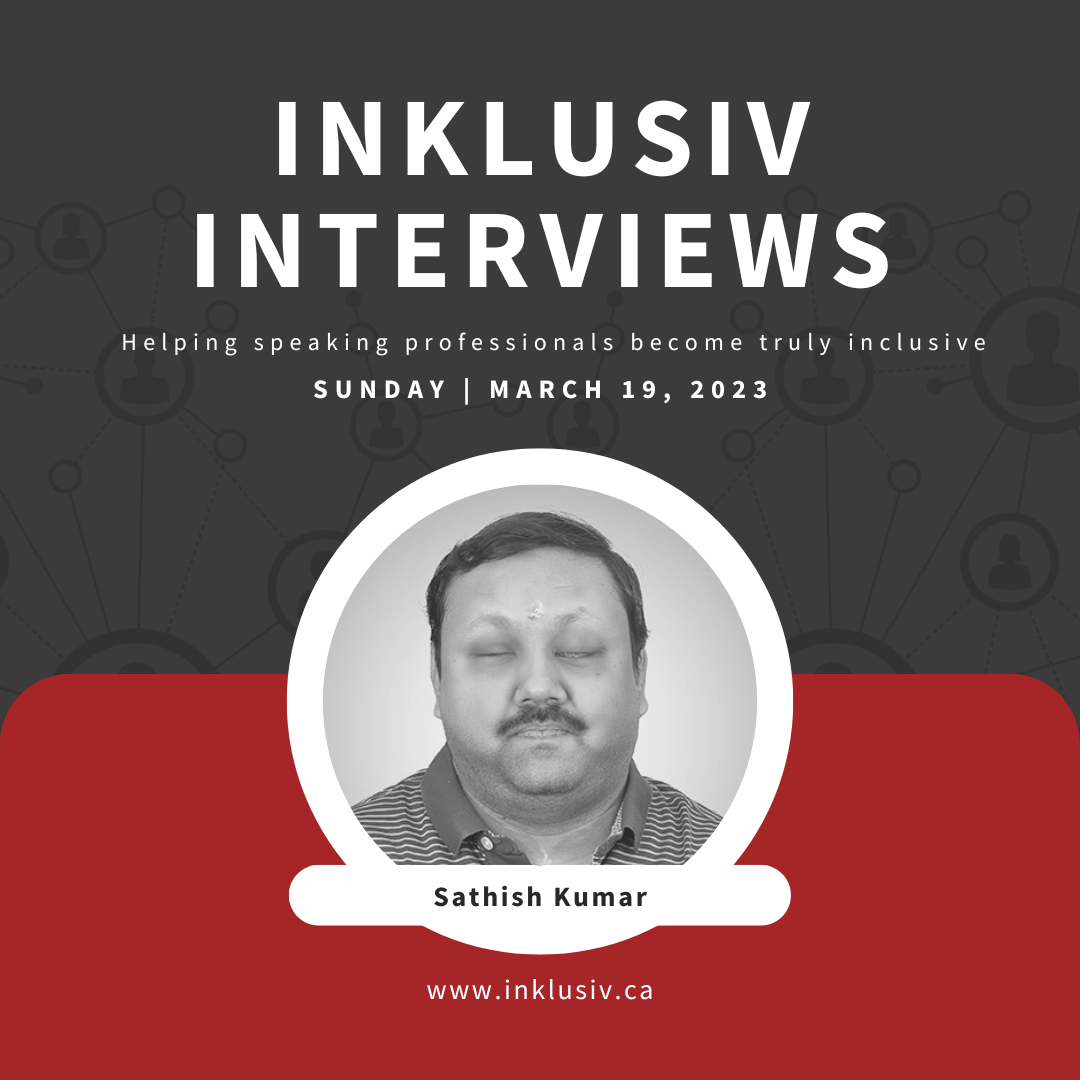Interview with Sathish Kumar, CPWA

Every week, we meet with audience members with disabilities who are willing to come forward and share a little bit about their own personal journey and experiences, attending live, in-person, or virtual speaking or training events. Through their unique and generous perspectives, speakers, trainers, facilitators, and other communication professionals can hopefully learn about some of the things that they do well, but also (and maybe more importantly) about some of the things they could improve to provide an experience that is truly inclusive of everyone.
Meet Sathish, an audience member who is blind
So, without further ado, let’s dive right into this week’s interview with Sathish Kumar, CPWA (he/him). Sathish is blind, and comes to us from Hyderabad, India.
Introductions
QUESTION 01 Can you tell us a bit about yourself, and how your disability might impact your experience, as someone who attends live in-person and virtual events?
My name is Sathish, and I was born blind. Until 2006, I didn’t know to operate a computer. So my days of education had been all in Braille. When I first got introduced to screen readers and a computer, I thought my life would be much more easier and happier.
As a person who attends and participates in live-in-person and virtual events, I have felt excluded as people didn’t know about inclusivity; inclusive communication or use of inclusive verbiage. When I attended one of the events recently, one organizer asked me to sit in a corner and let the people observe instead of providing a spot for me to speak or do something constructive. Maybe, they could have made me comfortable with more inclusive way of telling the same thing.
Things that ruin the experience
QUESTION 02 Thinking back on some of your experiences attending in-person or virtual events, what are some of the worst things speakers, trainers, and other communication experts can do to ruin your experience as an attendee?
I was attending an event on diversity where they were talking about inclusive words. But the presenters where just pointing like ‘this’ and ‘that.’ But they didn’t describe the slides, images or other visual aspects that complemented the presentation.
Things that make a positive impact
QUESTION 03 Can you share some of the great things speakers, trainers, and other communication experts sometimes do that make a positive impact on your ability to fully enjoy your in-person or virtual event experiences?
I know some accessibility expert professionals who send their slides in advance. Sometimes, some speakers send in an HTML version of the charts and tables, so that I could go through in advance and attend presentations. Some speakers really take time to describe the images and their value in the presentation, so that they explain the contexts and significance.
Sharing a piece of advice
QUESTION 04 If you had one piece of advice to give speakers, trainers, and other communication experts, so their content became more inclusive of people who have disabilities, what would it be?
Speakers should run their presentations through some inclusive communication experts; choose a platform that is most accessible to everyone; use inclusive verbiage in their presentations; ensure the audio and video setup works well.
Wrapping up
QUESTION 05 Thank you for sharing some of your insights with us today. As we wrap up our conversation, is there anything that you’d like to add, such as another thought, another piece of advice, another perspective, etc.?
Event organizers must be in cognizance of attendees with disabilities and ensure the events are inclusive. Content reviewers must look for any specific vocabulary like handicap spots or anything that excludes a particular disabled group/community/race, and provide feedback to the presenters so that they can correct them.
Connect with our guest on social
Interested in knowing more about our guest this week? You can follow Sathish on LinkedIn.

About Denis Boudreau
Denis Boudreau is a consultant, trainer, and speaker specializing in digital accessibility and disability inclusion. He works with organizational leaders who want to equip their teams with the skills to create accessible websites and digital products – so no one is left behind. A Certified Professional in Web Accessibility (CPWA), Denis has trained thousands of web professionals over the past 20+ years and delivered hundreds of workshops in both English and French. He has helped leading brands like Netflix, Salesforce, and Victoria’s Secret embed accessibility into their digital strategies, empowering them to meet legal obligations, improve user experience, and connect with more people, more effectively.
